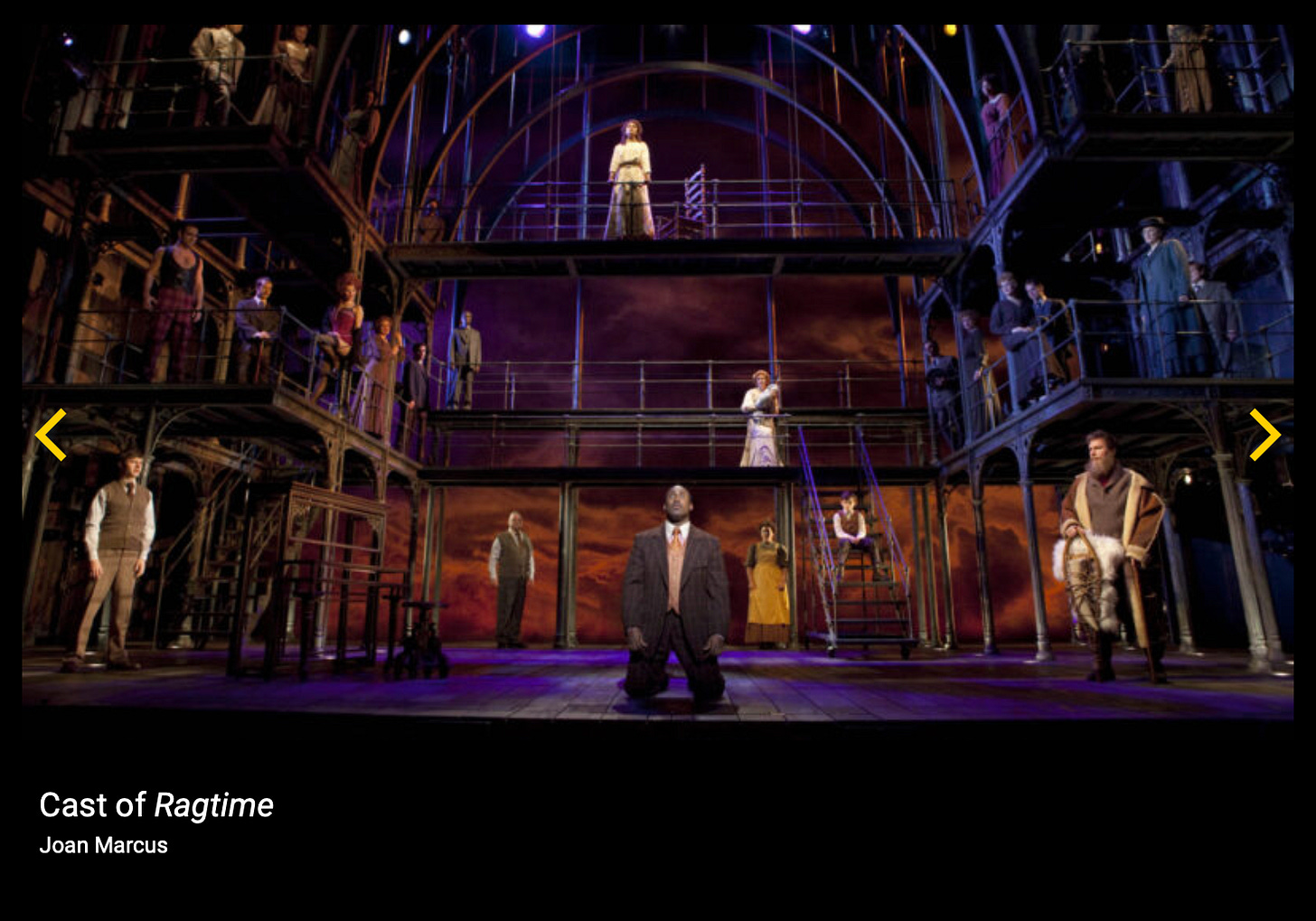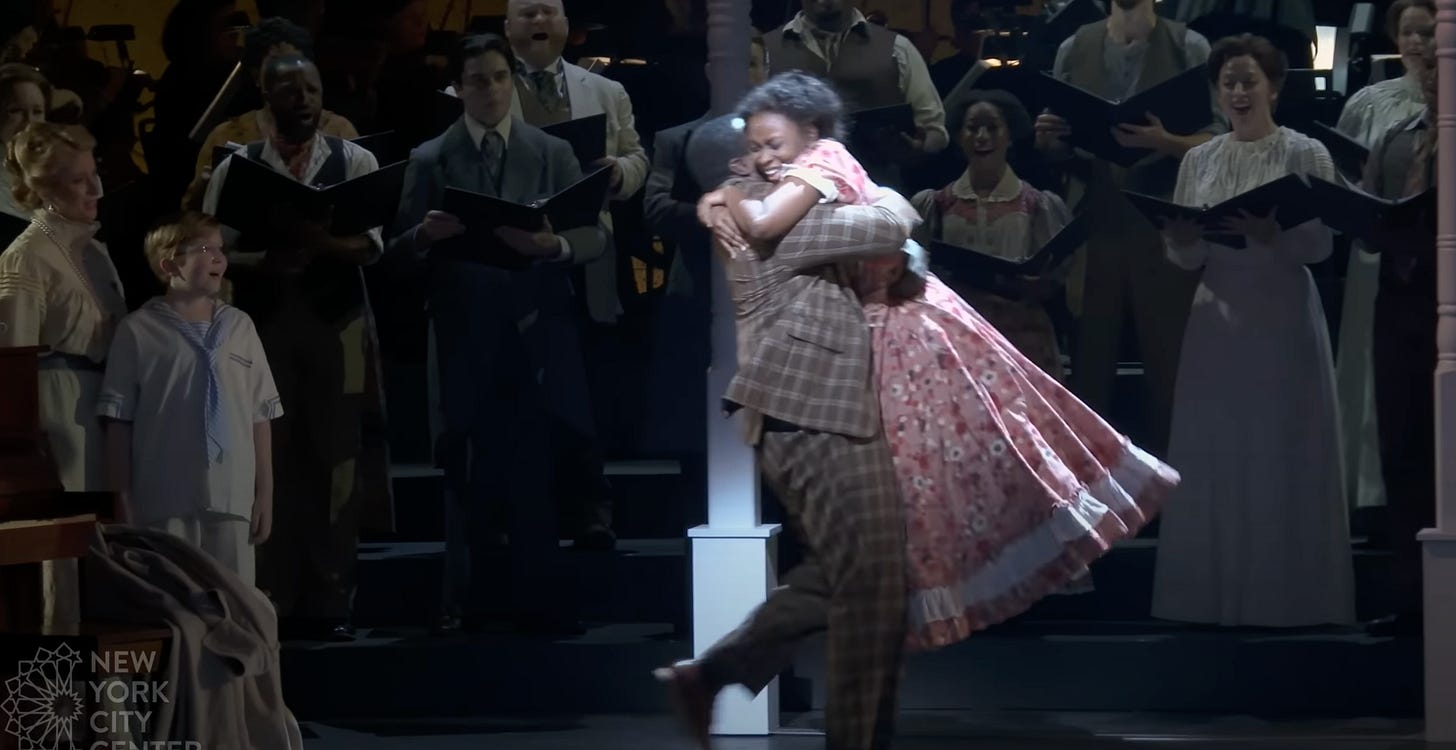Mitch's Notebook: The stirring drama of "New Music" from "Ragtime"
How a single scene illustrates key principles of great theatre-making
I’ve been very fortunate to see two excellent productions of the great musical “Ragtime” in the past year—one at Signature Theatre here in DC (review here), and one at New York’s City Center as part of their “Encores!” series. One scene struck me at both performances: the song “New Music.” The more I think about it, the more taken I am with the craft of it, from book writer Terrence McNally, lyricist Lynn Ahrens, and composer Stephen Flaherty. They wrote a beautiful song that is doing the triple duty of developing character, advancing plot, and packing an emotional gut punch. So for this edition of Mitch’s Notebook, I offer an analysis of that scene to illustrate some of the principles of great theatre.
I encourage you to put on the song while you read. You can access it on Spotify, YouTube, or other streaming sites.
The Setup
Before we dive into the scene, there’s some context you’ll need. (If you know the show well, you can skip this paragraph!) The musical “Ragtime” is based on the novel by E.L. Doctorow which tells three overlapping stories: that of an upper-class white family (Mother, Father, Younger Brother, and others); of an immigrant and his daughter; and of Coalhouse Walker, a Black musician, and the woman he loves, Sarah. At the top of the show, Father leaves for an expedition to the North Pole, leaving Mother in charge of the family. The white family and the Black characters’ lives begin to intersect when Mother finds Sarah’s newborn baby in the ground, whom she buried out of fear she wouldn’t be able to rely on Coalhouse to help raise him. After Mother takes in Sarah and the child, Coalhouse learns where she is and begins coming to the house every Sunday, trying to win her back. She steadfastly refuses to see him, but after many weeks, Mother eventually allows him to come inside for tea. When he sees their piano, he sits down and begins to play. At this moment, Father returns from his expedition to find things quite different than before: a Black man playing the piano, Sarah living in the attic, and their baby in a crib. He becomes angry at Mother, who stands by her choices and chastises him.

The Song Begins
Coalhouse is playing a simple melody in the ragtime style. Transitioning from dialogue into song is always a challenge for theatre-makers: why should these characters stop talking and start singing right now? (Even Sondheim struggled with this!) Here, that challenge is met by the character playing the actual music, not just the orchestra starting up the introduction to the song. The song itself is in the style of ragtime, fitting the era, the character who begins playing it—a ragtime musician—and the setting.
Father, Mother, and Younger Brother
Father hears the music. As he begins to sing, the “new music” he hears becomes a metaphor for the whole situation he finds himself in. “Where have I been / How did we change / Caught in this strange / New music / Say, was I away too long?”
In just five lines, we’ve come to know Father even better. Now it’s Mother’s turn. As she looks at Father, she sings: “Just like that tune / Simple and clear / I’ve come to hear / New music / Why, why can’t you hear the song?”
Again, in just a few lines, we understand her better. She’s befriended several Black people in an era when that would’ve been unacceptable for a woman of her race and class. In the past, she’d always followed Father’s instructions, but since he left she’s discovered a new agency she didn’t know she had.
Now it’s Younger Brother’s turn. He’s a man in search of his calling and seeing the love Coalhouse has for Sarah moves him. We’re witnessing the beginning of an admiration that will grow and motivate a crucial plot point later in the show.
Mother and Father are similarly moved by Coalhouse’s music and the intent behind it—to woo Sarah—as they sing together: “I thought I knew what love was / But these lovers play / New music.” Father becomes plaintive: “Why can’t I sing it, too?” he asks himself.
We’re not even halfway through the song, and a whole mini-drama has just played out among Mother, Father, and Younger Brother. Will Father come around to the new household Mother has created?
Coalhouse and Sarah
After Father’s line, more instruments are added to the orchestration, as the ensemble joins in to repeat the phrase. Along with us, they are watching the drama unfolding with Coalhouse and Sarah: “His fingers stroke those keys / And every note says ‘Please’ / And every chord says ‘Turn my way.’”
Now the accompaniment quiets as Coalhouse sings directly to Sarah, in what may be the most beautiful phrase of the song: “Sarah my life has changed / Sarah you’ve got to see / Sarah we’ve got a son / Sarah come down to me.”
The director of the City Center production, Lear deBessonet, recalled in an interview remembering that last musical phrase—“Sarah come down to me”—for years after seeing the show for the first time. When she finally got the cast album, she listened to see if she had remembered it correctly; she had! Wow. In her production of the show, Joshua Henry’s deep, gorgeous baritone brought that line to vivid life.
Now we’ve got a clear dramatic moment: Coalhouse has directly asked Sarah to come down from the attic and be with him. This is the engine of drama on stage! One character does something, now how will the other react? A good play is full of such moments—some small, some large. In a great play, the writing, direction, and acting heighten them. And in a great musical, the music does much of that work. In “New Music,” the orchestra swells just after he makes his grand ask, only to quiet again so we can hear Sarah’s response.
Sarah hears his playing. To her, his music is also “new”—it’s a song of commitment to her that she hasn’t heard from him before. She sings: “You and your music / Singing deep in me / Making nice to me / Saying something so new / Changing everything / Meaning everything / Calling my heart to you / Play that melody / Your sweet melody / Calling my heart to you.”
She’s moved by his song and her desire to be with him is growing. Coalhouse sings a beautiful counterpoint to her lyrics that furthers his pleading for her to join him.
At this point in the scene, my heart is pounding! The gorgeous music fills me up; the love he displays stirs me; and above all, the tension builds: Will she or won’t she?
A Grand Ending
As Sarah finishes her phrase, the key changes, stepping up, building and building. (That’s a common songwriting trick—lost of pop songs do it, too!) The ensemble sings “ooo”s, stepping up note by note, and on the final one, they switch to “ahh”—a much more open-mouth vowel that can create a louder sound. This change further heightens the crescendo, building the drama. (You can try this—try singing one note as “oo” and then as “ah”—which was louder?)
Spoiler alert: Sarah comes down! But how and when does she do it? Here’s where the director’s choices enter the picture. At City Centers, deBessonet sends Sarah down the stairs when the ensemble is singing their “ooo”s and “ahh”s. It’s a grand moment and it makes sense—I’d even bet the stage direction is written that way in the script. She rushes down the stairs and into his arms, where they stay together through to the end of the song, when he gets down on one knee to propose, and she accepts. It is stirring, emotional, and advances one more bit of plot: now they are engaged!
But I liked Signature Theatre director Matthew Gardiner’s choice better: he doesn’t let the lovers reunite quite yet. He has Sarah come part-way down the stairwell, tentatively. She’s still not sure if she wants to be with him! Throughout the whole rest of the song, she slowly approaches, and only at its grand finale does she tap his shoulder. He turns around and they embrace. I like this choice better because it draws out the tension for longer, letting us ride the wave of her decision along with her all the way to the end. Watch out for this type of choice at future shows you see: where do the director and performers lengthen a moment of decision to enhance the drama on stage? How does it make you feel as an audience member?
In the final verse, the ensemble is all together now accompanied by the full orchestra. A gorgeous swell of strings, reeds, brass, and percussion accompany them. “Just like that tune / Simple and clear / I’ve come to hear / New music / Breaking my heart / Op’ning a door / Changing the world / New music / I’ll hear it forever more.” The tune is the same but the scope of the lyrics has gotten way bigger: changing the world! Could music literally change the world? Could the sound of a new era help to mend past divisions? The music certainly makes you believe! And the conclusion—”I’ll hear it forevermore”—is so grand! Everyone has been changed by Coalhouse’s song and his devotion to Sarah and we will all love more deeply, they seem to say.

In Conclusion
And so, in one four-minute song, we’ve deepened the characters of Mother, Father, Younger Brother, Coalhouse, and Sarah; we’ve set up the beginnings of two plot lines (changes in Mother and Father’s relationship; Younger Brother’s growing dedication to Coalhouse); and majorly advanced the story line of Coalhouse and Sarah, reuniting them and setting them up to be wed. Incredible, right? I am in awe of the craft on display here! Gorgeous music that tells a compelling, dramatic story.
The song that follows this one—“Wheels of a Dream”—is the most famous from the show. And it’s beautiful! It’s a happy moment for these two characters—who so far haven’t had one—to finally be together, in love, dreaming about their son’s future. But I like “New Music” better because of the drama of it. Sondheim once said a song in a musical should be like a one act play—the characters should be different by the end of it. “New Music” achieves that in spades. Some of the most compelling moments in a show are those where a character is making a big decision. Good writing, thoughtful direction, and compelling performances build that tension and bring you along for the ride. The result is a thrilling experience for the audience!
I hope you enjoyed this deep dive into one of my favorite scenes in all of musical theatre. Every show can teach us something to make us more perceptive viewers—this one certainly taught me a lot.
See you at the theatre!






